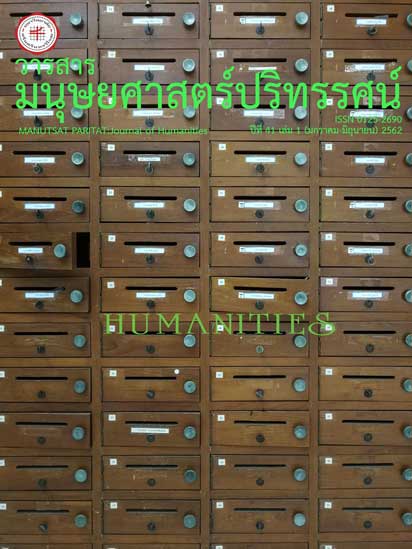ศักยภาพการนำคำศัพท์ภาษาอังกฤษด้านการรับสารไปใช้ในทักษะการพูดและการเขียนของนักศึกษาชั้นปีที่ 3 มหาวิทยาลัยราชภัฏภูเก็ต และอิทธิพลของหนังสือเรียนที่มีต่อ ปริมาณคำศัพท์ภาษาอังกฤษของนักศึกษา
Abstract
บทคัดย่อ การวิจัยนี้มีวัตถุประสงค์เพื่อศึกษา 1) ศักยภาพในการนำคำศัพท์ภาษาอังกฤษด้านการรับสาร (English receptive vocabulary) ไปใช้ในทักษะการพูดและการเขียน (speaking and writing skills) ของนักศึกษาชั้นปีที่ 3 มหาวิทยาลัยราชภัฏภูเก็ต และ 2) อิทธิพลของหนังสือเรียนที่มีต่อปริมาณคำศัพท์ภาษาอังกฤษของนักศึกษาชั้นปีที่ 3 มหาวิทยาลัยราชภัฏภูเก็ต ใน 2 แง่มุม คือ 2.1) คุณภาพของหนังสือเรียนในด้านทั่วไปและด้านคำศัพท์ภาษาอังกฤษ และ 2.2) ระดับความยากของคำศัพท์ภาษาอังกฤษที่ใช้ในหนังสือเรียนกลุ่มตัวอย่างในงานวิจัยนี้คือ นักศึกษามหาวิทยาลัยราชภัฏภูเก็ต จำนวน 204 คน โดยใช้เครื่องมือวิจัยคือ 1) ข้อสอบวัดความรู้คำศัพท์ด้านการส่งสาร (productive vocabulary test) 2) ข้อสอบวัดความรู้คำศัพท์ด้านการรับสาร (receptive vocabulary test) 3) หนังสือเรียนวิชาภาษาอังกฤษเพื่อการสื่อสารทั่วไปและวิชาภาษาอังกฤษเพื่อวิชาชีพ 4) แบบสอบถามเพื่อประเมินคุณภาพหนังสือเรียน และ 5) โปรแกรมตรวจสอบระดับความยากของคำศัพท์ “Check Words Up” ผลการวิจัยแสดงให้เห็นว่า 1) ศักยภาพการใช้คำศัพท์ด้านการรับสาร (receptive vocabulary) ในทักษะการเขียนและการพูด (writing and speaking skills) ของนักศึกษา อยู่ในระดับร้อยละ 49.96 หมายความว่า จากคำศัพท์ที่นักศึกษารู้ความหมาย 100 คำ นักศึกษาสามารถนำไปใช้ในการพูดและเขียนได้เพียง 49.96 คำ เท่านั้น 2) ในการประเมินคุณภาพทั่วไปและด้านคำศัพท์ภาษาอังกฤษของหนังสือเรียนวิชาภาษาอังกฤษเพื่อการสื่อสารทั่วไปและวิชาภาษาอังกฤษเพื่อวิชาชีพ พบว่าหนังสือทั้งสองเล่มมีคุณภาพในระดับปานกลาง อีกทั้ง ผลการวัดระดับความยากของคำศัพท์ภาษาอังกฤษในหนังสือเรียนทั้งสอง พบว่า คำศัพท์จำนวนมากกว่าร้อยละ 90 ของคำศัพท์ทั้งหมดในหนังสือ อยู่ในระดับพื้นฐานที่ระดับ 1000 – 2000 แต่มีเพียงไม่ถึงร้อยละ10 เป็นกลุ่มคำศัพท์ที่มีระดับความยากเหมาะสมกับนักศึกษา (ระดับตั้งแต่ 3000 ขึ้นไป) คำสำคัญ: คำศัพท์, ปริมาณคำศัพท์, ศักยภาพ, หนังสือเรียน, การประเมิน Abstract The purposes of this research were to study: 1) the proficiency in using receptive vocabulary in speaking & writing skills of the third year students of Phuket Rajabhat University, and 2) the impact of textbooks on the students’ English vocabulary knowledge in the two aspects: 2.1) textbooks’ qualities in the overview and English vocabulary aspect and 2.2) difficulties of vocabulary used in the textbooks. The subjects of this study were 204 third year students of Phuket Rajabhat University. The data obtained through 5 research instruments: 1) productive vocabulary test 2) receptive vocabulary test 3) English for General Communication Textbook & English for Professional Communication Textbook, 4) questionnaire for assessing textbooks’ qualities, and 5) Check Words Up Program. The research reviewed that 1) their proficiency in using English receptive vocabulary in speaking & writing skills was 49.96 percent; out of their 100 known words, they can only use 49.96 words in their speaking and writing. 2) In assessing the qualities of English for General Communication Textbook & English for Professional Communication Textbook, the results showed that the qualities of the two textbooks in the overview and English vocabulary aspect were at a moderate level. According to the difficulties of English vocabulary used in the textbooks, over 90 percent of all words was in 1000-2000 word levels and below 10 percent was in 3000 word level onward. Keywords: vocabulary, vocabulary size, proficiency, textbook, evaluationDownloads
Published
2019-09-05
Issue
Section
บทความวิจัย


